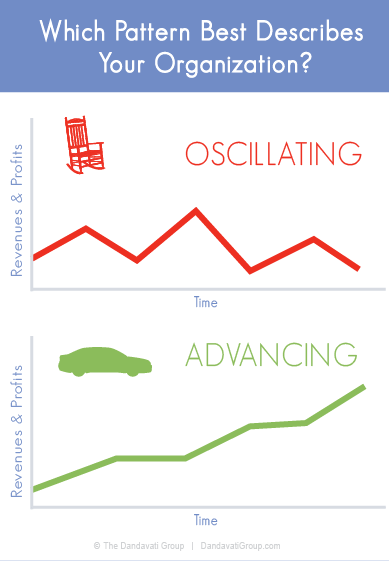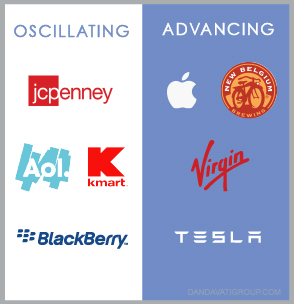Most businesses and non-profits would love to see consistent, sustainable growth.
Frequently, however, the growth an organization enjoys becomes eroded over time – then new efforts spur new growth – which again becomes eroded and is subsequently followed by more efforts – and so on.
In this newsletter we will explore some causes of this and look at how organizations can change the way they fundamentally operate so they may enjoy consistent, sustainable growth and realize their fullest potential and Vision.
Advancing vs. Oscillating Structural Patterns
In his groundbreaking book “The Path of Least Resistance for Managers,” Robert Fritz writes about Advancing and Oscillating structures.
A company or organization that grows consistently in revenue, profit and size can be described as an organization with an advancing structure. Apple is easily recognizable as a company with an advancing structure.
A common characteristic of advancing companies is that they are very clear about their organization’s Vision and Purpose. They are also objective and have singular clarity about their “Current Reality,” i.e. where the company stands – the good, the bad and the ugly – in relationship to that Vision.
The opposite of an advancing structure is an oscillating structure. Companies with oscillating structures find themselves in cyclical patterns – initially making advances but then sliding backwards, never gaining in the long-term.

JCPenney is a good example of this. While the company has been able to stay in business, and continually tried to reinvent itself, it hasn’t experienced significant growth or met performance goals.
We commonly only hear and see press about advancing companies, or the ones that crash and flame out. We hear less about oscillating companies, because they hang on, but watching them ebb and flow does not make for spectacular headlines.
Common Causes of Oscillation
How does a company fall into a pattern of oscillation?
Lack of clarity of Vision and direction, competing priorities, and lack of organizational alignment are some factors that cause an organization to oscillate.
Organizations get off-track when there isn’t clarity about Vision, and/or shared clarity about that Vision. The kind of ‘Vision’ we speak of is not the philosophical Vision Statement an organization may have posted on its wall but rather the Vision about where the organization wants to find itself, say three to five years in the future.
(Which companies or brands would you add to the list below?)

Insufficient insight and shared understanding about an organization’s Current Reality is another common cause of oscillation. In a misaligned company, each department may strive to do well as a unit but may neglect to truly support the overall advancement of the company.
The attitudes are something like this: Sales argues: ‘without us, the company would have no customers’ and Operations reasons: ‘without us, Sales would have nothing to sell.’ Competing priorities between various elements of the organization lead to development of silos. Efforts are wasted and frustration and animosity can develop.
3 Keys to Sustainable Advancement
Moving From Oscillation to Sustainable Advancement
A software company we worked with recently is an excellent example of a company’s movement from an oscillating to advancing structure. Caught in a pattern of oscillating results, they had gotten themselves into business endeavors and contracts with clients that were driven by short-term needs and limited their upside significantly. While they paid the bills, they were not going anywhere.
The company began their transformation by developing a proactive strategy that was in alignment with their longer-term aspirations and their unique strengths. They prioritized long-range goals over immediate needs.
Creating a hierarchy of priorities and timeline that made sense, the company organized their Vision, strategies and goals to create an internal shift. These were built on real strengths, strategic competencies and passion. They also said “no” to things that didn’t belong with the strategy they’d crafted.
As we worked with their team, they literally came alive and decided to 'fire' some of their clients who were essentially ‘dead-end' customers.
Three years after our initial work with them, the company has significantly raised revenues, profits and the value of their enterprise. They have suitors who are talking to them about an acquisition at a significant valuation. The future is bright indeed!
The Bottom Line
What strikes us is that both advancing and oscillating organization have hard-working, well-intentioned leadership and staff. Achieving sustainable growth is not about getting people to work harder or even being more collaborative – it’s a structural issue. Once you set up an advancing structure, where priorities and goals are structured in such a way that they all support the overarching Vision – all the hard work will start paying off in new and exciting ways.
Is Your Organization Structured for Growth™?
For the past 20 Years The Dandavati Group has supported companies and non-profits in a wide variety of industries in creating and sustaining significant growth, profitability and desired outcomes.
Please email Kumar@DandavatiGroup.com (or call our office at 303-697-1265) to discuss how The Dandavati Group can assist your organization in creating powerful, sustainable and consistent results!


